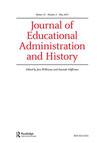英格兰的信任赤字:关于学校领导和流行病的新研究证据
IF 1.6
Q2 EDUCATION & EDUCATIONAL RESEARCH
Journal of Educational Administration and History
Pub Date : 2021-09-13
DOI:10.1080/00220620.2021.1975366
引用次数: 13
摘要
自2020年3月以来,英格兰一直与COVID-19共存,经历了高峰和低谷。政策制定者将学校视为经济和社会维持和恢复的组成部分,因此高度重视教育,将其作为在相当不确定和不稳定的很长时期内运行的稳定供应。由于感染水平的迅速变化以及对传播和预防措施的科学理解,政府经常在最后一刻根据不同程度的封锁调整了有关学校开放和关闭的法律要求。学校领导面临着疫情前难以想象的挑战。由于学校是病毒传播的主要场所,领导人不得不特别注意对教职员工、学生和建筑物的管理。作者与两个领导人协会合作,设计并开展了一项全国调查,以评估疫情对领导人福祉和职业规划的影响。虽然作者还没有完成对那些打算离开和打算留下的人的抽样采访,但很明显,要赢回他们所依赖的学校领导,政府还有一段路要走。本文章由计算机程序翻译,如有差异,请以英文原文为准。
The trust deficit in England: emerging research evidence about school leaders and the pandemic
England has been living with COVID-19, through peaks and troughs since March 2020. Policymakers see schools as integral to economic and social maintenance and recovery and have thus placed a high priority on education as a stable provision operating throughout a very long period of considerable uncertainty and instability. Because of rapidly changing levels of infection and scientific understandings of transmission and prevention measures, the government has adjusted, often at the last minute, the legal requirements around the opening and closing of schools in line with the various levels of lockdown. School leaders have been faced with challenges unimaginable prior to the pandemic. Because schools are a major site for virus transmission, leaders have had to pay particular attention to the management of staff, pupils and buildings. Working together with the two leader associations, the authors designed and conducted a national survey to assess the impact of the pandemic on leaders' well-being and career plans. While the authors have not yet completed interviewing a sample of those intending to leave and those intending to stay, it is abundantly clear that the government has some way to go to win back the school leaders on whom they depend.
求助全文
通过发布文献求助,成功后即可免费获取论文全文。
去求助
来源期刊

Journal of Educational Administration and History
EDUCATION & EDUCATIONAL RESEARCH-
CiteScore
3.80
自引率
5.60%
发文量
25
 求助内容:
求助内容: 应助结果提醒方式:
应助结果提醒方式:


